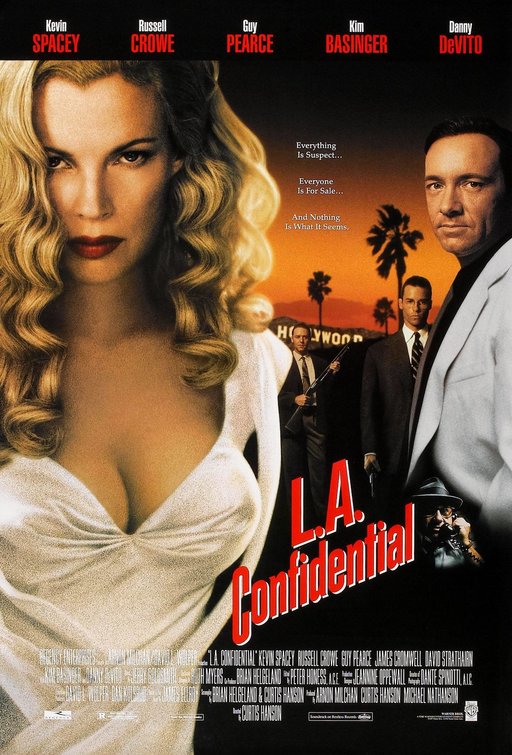Since the fall of 2009, I've been thinking more and more about how the last ten years have affected my outlook and taste. Since I've amassed a pretty decent collection of DVDs dating from the early 2000s, I've decided that it would be fun to revisit the movies that I liked back around the beginning of the decade to get a critical look at how well they've held up. This is the (long overdue) third of the series.
The movie: L.A. Confidential was a critical darling and a pretty successful 1997 pulp-noir film that was more or less overshadowed in the popular imagination by Titanic-mania, although it did net Oscars for Kim Basinger (Best Supporting Actress) and Brian Helgeland and Curtis Hanson (Best Adapted Screenplay). It's an adaptation of James Ellroy's novel of the same name.
What I thought at the time: I went into L.A. Confidential as a high-schooler thinking that it was going to be lame because of the 1950s period setting. Instead, I was blown away by the labyrinthine plot, violence, and blackhearted cynicism. It was probably one my first exposure to noir as a genre (although it's more of a homage), and it definitely sparked an interest in the form.
On further viewing: As a movie, L.A. Confidential is a great by pretty much any measure, but it's one of the absolute best adaptations ever made. The novel L.A. Confidential is brilliant but unfilmable: the plot of the book is incredibly convoluted and spans decades, and just establishing the sheer amount of characters would take most of the running time of a feature film. The movie trims all that down drastically, yet still manages to capture the spirit of the book to a surprising degree. How?
A big factor is the white-hot laser perfection of the casting. Check this list: along with Basinger, L.A. Confidential features Kevin Spacey when he was still good, Russell Crowe, Guy Pearce, Danny DeVito, James Cromwell, and David Strathairn. Although the plot diverges significantly from the source material, the characters are incredibly faithful, and a surprising amount of Ellroy's world comes through in small details peppered into the background. The screen adaptation smartly plays up the dynamic between underestimated hothead police officer Bud White (Crowe) and coolly analytic careerist detective Ed Exley (Guy Pearce). Both actors disappear into their roles completely; re-watching L.A. Confidential reminds me why Russell Crowe is a major star and why Guy Pearce ought to be one (seriously, between this, Memento, and The Proposition, how many more reasons do casting directors need to put Pearce in their movies?).
The screenplay, which doesn't so much reproduce the plot of the novel as distill it into an extremely streamlined form, rarely suffers from the abridgment. The only real exception to this is Jack Vincennes' (Kevin Spacey) character arc, which is pretty severely pared down and ends in an effective but somewhat contrived twist that feels transparently motivated by the need to get to the third act underway. On the whole, though, there's remarkably few seams for such a complicated endeavor.
A final aspect of L.A. Confidential that bears mention is the direction and the visual design. It must have been tempting to do the film as a fanboy-style homage to 1950s noir, but director Curtis Hanson downplays the anachronisms and recasts the genre to acknowledge the cultural and technical changes in filmmaking. Hanson's version emphasizes naturalistic acting, elaborate set design, masterful widescreen cinematography, and unrestrained profanity and violence, none of which were trademarks of the heyday of crime noir. Even though the film's unmistakably a period piece, there's a heavy emphasis on contemporary elements that make it compulsively watchable for non-genre buffs. The modern feel of L.A. Confidential has the side benefit of calling attention to the thematic parallels with the LAPD's early-90s corruption scandals without being heavy-handed about it.
In the final accounting, L.A. Confidential does justice to Ellroy's book. Hollywood is one for two in feature adaptations of Ellroy's work, with the demerit being Brian DePalma's campy butchering of The Black Dahlia. Apparently, George Clooney was cast as the lead in White Jazz, but dropped out. It's a shame, he's perfect for that character. What I'd really like to see is a big-budget miniseries adaptation of American Tabloid, Ellroy's fantastic historical conspiracy noir centered around the Kennedy assassination. Apparently this may actually happen, with HBO's backing. I'll believe it when I see it, but if it happens, it could really be something to look forward to.
Saturday, May 1, 2010
Subscribe to:
Post Comments (Atom)

No comments:
Post a Comment